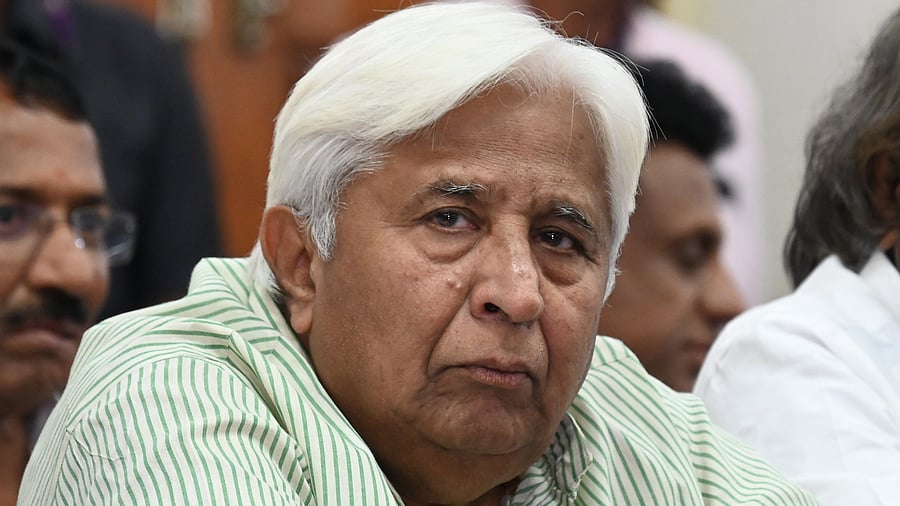
Law and Parliamentary Affairs Minister H K Patil
Credit: DH Photo
Law and Parliamentary Affairs Minister H K Patil outlines the government’s commitment to legislative discipline, legal modernisation and public welfare in an interview with N B Hombal of DH. Excerpts:
The budget session saw a lot of disruptions and walkouts by the Opposition. How do you plan to conduct the monsoon session?
The budget session was unfortunately marked by repeated disruptions by the Opposition, whose conduct often crossed boundaries of democratic decorum. Their approach was not just one of disagreement, but of extreme non-cooperation. To restore order, the House had to take firm and necessary measures.
Your party has a majority in the Lower House, but not a comfortable position in Upper House. Opposition support is key for passing contentious bills. What will be your strategy?
Our floor strategy is centred on openness, transparency and dialogue. We will talk about every bill carefully and want good discussion from everyone. Despite numerical challenges, we passed over 100 bills — about 50 of them entirely original. These are not symbolic legislations, but rooted in public welfare.
A key example is the amendment to the Civil Procedure Code. The introduction of mandatory mediation is a bold, progressive step that will help reduce court burdens and encourage amicable resolutions. Our bill on prevention of coercive recovery practices is also widely appreciated.
The Opposition claims that your government rushes through bills without giving them time to prepare.
That remark is completely unfounded. Since our government came to power, we have always ensured that bills are circulated well in advance, a day or two earlier. These bills are delivered to the Opposition’s designated rooms in the Vidhana Soudha.
How many bills will be introduced in this session?
The legal department has completed scrutiny of about 25 bills that will be introduced. Key among them are: The Karnataka Rohith Vemula (Prevention of Exclusion or Injustice) Bill (focuses on education and dignity); The Karnataka Hate Speech and Hate Crime Bill (to combat hate-based offences); Prohibition of Online Betting Bill (addressing illegal betting activities); Karnataka Misinformation and Fake News Bill (targets spread of false information); The Karnataka Crowd Control Bill and prevention of social boycott bill.
As the newly appointed border-in-charge minister, how do you view the ongoing dispute with Maharashtra?
We are on solid legal and moral ground when it comes to the border dispute with Maharashtra. Unfortunately, that state has repeatedly tried to politicise the issue. For Karnataka, the Mahajan Award is final. If not the Mahajan Award, it must be status quo.
The Krishna Water Disputes Tribunal (KWDT) has received another extension. What is your response?
The extension granted to the tribunal is concerning. While it may serve as an alibi for delaying publication of the KWDT Award, it goes against the spirit of the Inter-State Water Disputes Act. The extension has no bearing on the publication of the KWDT Award of 2013, which allocates surplus water to Karnataka. We insist that the union government immediately publish the award under Section 6(1) of the Act.
What changes are being suggested in the Prohibition of Child Marriage (Karnataka) Bill?
The key amendment is to criminalise child engagements, which were not punishable earlier. By bringing child engagement under the purview of the law, we can intervene earlier and prevent child marriages more effectively.
Are there plans to adopt AI (artificial intelligence) in law department?
AI has reached all parts of our personal and public workspaces. We are actively exploring the adoption of AI — particularly for basic translation work and opinion writing. We have begun consultations with experts to ensure responsible and effective integration, without compromising on legal integrity and human nature in justice delivery.
A section of civil society and the Opposition have raised concerns that the Karnataka Misinformation and Fake News Bill could infringe on fundamental rights?
I want to be very clear — this bill is not an attack on the right to freedom of speech. It is aimed at preventing the misuse of the right to freedom of expression and instigating public emotions. The bill will have built-in checks and safeguards.
